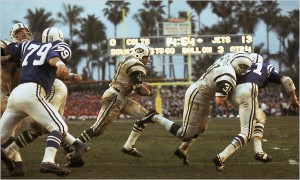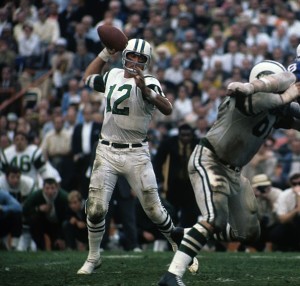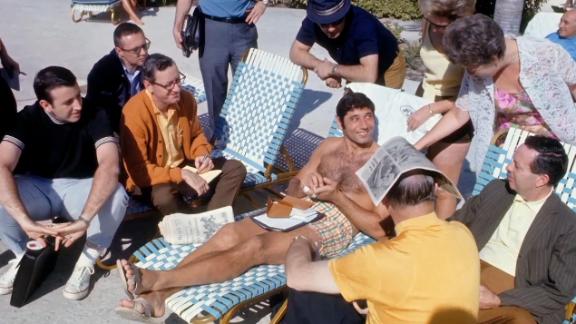50 Years Ago: Joe Namath and the Jets Shock the World
With apologies to boxing legend Muhammad Ali, the most shocking sports victory of the 1960s took place 50 years ago on January 12, 1969 when the underdog New York Jets lifted the fortunes of an entire league by defeating the heavily favored Baltimore Colts in Super Bowl III.
Though the American Football League (AFL) was completing its ninth season and the champions of the AFL and National Football League (NFL) were meeting for the third straight year, most people did not consider the two leagues to be equal. In fact, it is reported that NFL Commissioner Pete Rozelle believed it might be another decade before the AFL would be an equal to the NFL and that a new format for the Super Bowl might be needed.
In hindsight, we know that the two leagues were indeed much closer in competitiveness than Rozelle believed, but at the time his reasoning was hard to argue against. The NFL Champion Green Bay Packers had claimed the first two Super Bowls by a combined margin of 68-24 and the current NFL Champion Baltimore Colts were perhaps an even more dominant champion than Green Bay.
While the Colts were an established NFL power, the New York Jets were an AFL upstart that had just completed the second winning season in franchise history and were making their first-ever trip to the playoffs.
However, one “ace in the hole” for the Jets was roaming their sidelines. Head Coach Week Ewbank had won two NFL Championships during his nine year tenure as coach of the Baltimore Colts. After moving to the Jets, he had taken the team from a basement dweller to league champions.
During both his time with the Colts and the Jets, Ewbank had the benefit of having an elite franchise quarterback leading the offense.
In Baltimore, he turned Johnny Unitas into an all-time great. Though New York Jets quarterback Joe Namath had not yet reached that status level, in 1967 he did become the first quarterback in pro football history to pass for more than 4,000 yards in a season.
Of course, entering Super Bowl III Namath was better known for his reputation as “Broadway Joe” than for his performance on the field. He was seen by some as the “poster boy” for what was wrong with the youth of the late 1960s.
He didn’t do anything to alter that opinion during the days before the Super Bowl. Though the Colts were overwhelming favorites, Namath spent much of the week prior to the game poking the beast.

Matt Snell was the workhorse of Super Bowl III with 30 rushing attempts, four receptions and 161 yards of total offense.
During the flight to Miami he told reporter Dave Anderson that there were at least five quarterbacks in the AFL (including his 38-year-old backup Babe Parilli) were better than Baltimore starter and NFL MVP Earl Morrall (who had replaced the injured Unitas as quarterback for most of the season).
Then, during an appearance at the Miami Touchdown Club he said, “We’re gonna win the game. I guarantee it.”
Ewbank was expectantly not happy with his quarterback for making such statements. However, he didn’t necessarily believe that Namath was wrong, he just believed that the Colts might be taking his team a little lightly and didn’t want to provoke them.
While the Colts had great confident in their team and didn’t find it necessary to make any significant adjustments, the defensive line was looking to shut up “Joe the Mouth”.
Newsday writer Dick Clemente wrote, ““Baltimore’s front four, incensed at Namath’s antics and remarks during the week, has secretly pledged to make Broadway Joe an older, sadder and wiser young man.”
As it turned out, it was the Colts who looked older and sadder at the end of the game.
Because the Jets were in control on the scoreboard throughout the entire game, it is easy to assume that the game was lopsided. However, the reality is that there was one area that decided the game in the favor of the Jets, turnovers.
The Colts were able to move the ball down the field most of the game, but were victimized by five turnovers, including four pass interceptions.
They also missed other golden opportunities, including a missed 27-yard field goal on their first possession of the game after the Colts had driven to the 19-yard line.
Early in the second quarter of a scoreless game, the Colts again drove deep into Jets territory, but a Morrall pass was tipped and then intercepted in the end zone by Randy Beverly.
The Jets then drove the ball down the field, primarily on the running of Matt Snell and middle range passes by Namath. They scored the first touchdown of the game on a four-yard run by Snell.
Baltimore quickly drove back into New York territory with a 30-yard completion from Morrall to Tom Matte leading the charge, but kicker Lou Michaels missed his second field goal of the game, this one from 46-yards.

Joe Namath didn’t throw a touchdown pass in Super Bowl III, but he moved the offense with the precision of a surgeon.
With only seconds remaining in the half Baltimore had another chance to tie the game, but Morrall did not see receiver Jimmy Orr wide open near the end zone and instead threw a pass to the middle of the field that was intercepted by Jim Hudson.
While the first half was generally pretty even, the Jets totally dominated the third quarter. They controlled the ball for all but three minutes of the quarter and kicked a pair of field goals to take a 13-0 lead.
Another field goal in the opening seconds of the fourth period made the score 16-0 and put the shocked Colts in desperation mode.
Legendary coach Don Shula eventually made the move from Morrall, who completed only six of 17 passes for 71 yards with three interceptions, to a sore armed Unitas.
Despite not being at full strength, Unitas was able to pass for 110 yards as the Colts were forced to try and catch-up via the pass as time was as much an enemy as the Jets. He led the Colts deep into Jets territory on his first drive at the helm, but Beverly registered is second end zone interception of the game.
Later in the quarter, the Colts again drove down the field and this time finally reached the end zone with a one-yard touchdown run by Jerry Hill with 3:19 left in the game. A successful onside kick kept hope alive for the Colts, but after reaching the New York 19-yard line they were unable to get the ball into the end zone.
As they did throughout the game, the Jets used Snell and the running game to eat away the clock and close out the victory.
Interestingly, Namath was named the Super Bowl MVP despite the fact that he remains the only quarterback in Super Bowl history to win the award without throwing a touchdown pass. He did complete 17 of 28 passes for 206 yards and called a nearly perfect game beautifully mixing the run and pass.
Matt Snell may not have been the Super Bowl MVP, but he was definitely the workhorse of the game as he rushed 30 times for 121 yards and a touchdown while also catching four passes for 40 yards.
Even with the AFL victory there were still many who saw the win as a fluke and didn’t think the AFL was yet comparable. However, any doubt was erased the next year as the Kansas City Chiefs dominated the Minnesota Vikings 23-7 in the last Super Bowl before the official league merger.
But while Super Bowl IV leveled the field, it is Super Bowl III that will always be remembered as the game that forever changed professional football and put the Super Bowl on the path to becoming the biggest annual sporting event in America.
